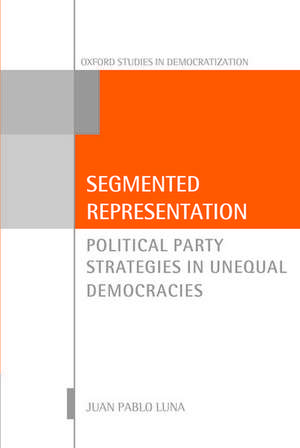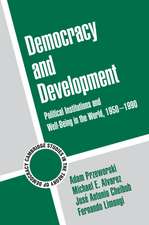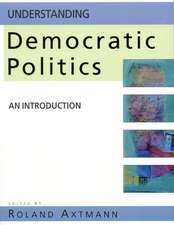Segmented Representation: Political Party Strategies in Unequal Democracies: Oxford Studies in Democratization
Autor Juan Pablo Lunaen Limba Engleză Hardback – 17 apr 2014
Din seria Oxford Studies in Democratization
- 26%
 Preț: 575.27 lei
Preț: 575.27 lei - 18%
 Preț: 586.99 lei
Preț: 586.99 lei - 30%
 Preț: 543.00 lei
Preț: 543.00 lei - 6%
 Preț: 226.73 lei
Preț: 226.73 lei - 34%
 Preț: 630.77 lei
Preț: 630.77 lei - 18%
 Preț: 360.34 lei
Preț: 360.34 lei - 30%
 Preț: 627.91 lei
Preț: 627.91 lei - 12%
 Preț: 284.61 lei
Preț: 284.61 lei - 41%
 Preț: 148.88 lei
Preț: 148.88 lei - 34%
 Preț: 1068.97 lei
Preț: 1068.97 lei - 34%
 Preț: 940.37 lei
Preț: 940.37 lei - 23%
 Preț: 283.74 lei
Preț: 283.74 lei - 34%
 Preț: 657.54 lei
Preț: 657.54 lei - 17%
 Preț: 315.61 lei
Preț: 315.61 lei - 30%
 Preț: 599.31 lei
Preț: 599.31 lei - 34%
 Preț: 1038.70 lei
Preț: 1038.70 lei - 30%
 Preț: 563.18 lei
Preț: 563.18 lei - 34%
 Preț: 598.50 lei
Preț: 598.50 lei - 18%
 Preț: 310.26 lei
Preț: 310.26 lei - 13%
 Preț: 249.02 lei
Preț: 249.02 lei - 34%
 Preț: 1010.59 lei
Preț: 1010.59 lei - 21%
 Preț: 201.21 lei
Preț: 201.21 lei - 18%
 Preț: 236.15 lei
Preț: 236.15 lei - 34%
 Preț: 776.32 lei
Preț: 776.32 lei - 27%
 Preț: 376.39 lei
Preț: 376.39 lei - 8%
 Preț: 308.83 lei
Preț: 308.83 lei - 34%
 Preț: 752.83 lei
Preț: 752.83 lei - 9%
 Preț: 282.68 lei
Preț: 282.68 lei - 34%
 Preț: 1288.78 lei
Preț: 1288.78 lei - 30%
 Preț: 657.29 lei
Preț: 657.29 lei - 18%
 Preț: 324.02 lei
Preț: 324.02 lei - 30%
 Preț: 628.06 lei
Preț: 628.06 lei - 21%
 Preț: 532.88 lei
Preț: 532.88 lei - 39%
 Preț: 270.29 lei
Preț: 270.29 lei - 27%
 Preț: 357.98 lei
Preț: 357.98 lei - 25%
 Preț: 630.22 lei
Preț: 630.22 lei - 34%
 Preț: 851.54 lei
Preț: 851.54 lei - 34%
 Preț: 589.55 lei
Preț: 589.55 lei - 34%
 Preț: 944.10 lei
Preț: 944.10 lei - 51%
 Preț: 835.80 lei
Preț: 835.80 lei
Preț: 807.02 lei
Preț vechi: 1157.66 lei
-30% Nou
Puncte Express: 1211
Preț estimativ în valută:
154.42€ • 161.23$ • 127.80£
154.42€ • 161.23$ • 127.80£
Carte tipărită la comandă
Livrare economică 24-31 martie
Preluare comenzi: 021 569.72.76
Specificații
ISBN-13: 9780199642649
ISBN-10: 0199642648
Pagini: 402
Dimensiuni: 162 x 239 x 29 mm
Greutate: 0.74 kg
Editura: OUP OXFORD
Colecția OUP Oxford
Seria Oxford Studies in Democratization
Locul publicării:Oxford, United Kingdom
ISBN-10: 0199642648
Pagini: 402
Dimensiuni: 162 x 239 x 29 mm
Greutate: 0.74 kg
Editura: OUP OXFORD
Colecția OUP Oxford
Seria Oxford Studies in Democratization
Locul publicării:Oxford, United Kingdom
Recenzii
This is a path-breaking study of democratic representation in highly unequal societies. Juan Pablo Luna convincingly demonstrates that segmented societies create both incentives and opportunities for political parties'-on both the left and the right-to use different types of electoral appeals to attract distinct groups of voters. Drawing from survey data and field research in Chile and Uruguay, Luna shows how parties craft electoral strategies that combine programmatic, clientelistic, and personalistic linkages to voters, allowing them to generate support among heterogeneous but socially segmented constituencies. The result is a masterful analysis of how inequality structures democratic representation-and, ultimately, how democracy can reproduce social inequality.
High levels of income inequality pose a challenge to politicians. They need to keep the rich happy to keep investment and donations flowing and the poor happy to secure their votes. How do politicians and parties reconcile the demands of these different constituencies in the most unequal part of the world? In this pathbreaking study, Luna suggests that they simultaneously deliver policies to the rich and pork to the poor. He supports his argument with rich empirical work drawn from the experiences of two new Latin American democracies, Chile and Uruguay, as well as other cases from the region and India. This book will be a must-read for students of representation, electoral behavior and political parties in established as well as new democracies, and will also prove invaluable to practitioners of approaches to empirical research that draw on mixed-methods.
Segmented Representation is one of one of the most important books on Latin American parties to be published in decades. Drawing on painstaking research in Chile and Uruguay, Luna shows that the kinds of programmatic appeal made by parties in advanced industrialized (and often taken for granted in theories of party behavior) are less viable in highly unequal societies, and that successful parties must make segmented appeals to diverse--even seemingly opposed--constituencies. The concept of segmented linkages will diffuse widely among scholars. Lunas work helps us understand why parties operate differently in a context of extreme inequality, while at the same time showing how segmented linkages work to reinforce existing inequalities. The book will make a major contribution to the study of political parties, not only in Latin America but throughout the developing world.
High levels of income inequality pose a challenge to politicians. They need to keep the rich happy to keep investment and donations flowing and the poor happy to secure their votes. How do politicians and parties reconcile the demands of these different constituencies in the most unequal part of the world? In this pathbreaking study, Luna suggests that they simultaneously deliver policies to the rich and pork to the poor. He supports his argument with rich empirical work drawn from the experiences of two new Latin American democracies, Chile and Uruguay, as well as other cases from the region and India. This book will be a must-read for students of representation, electoral behavior and political parties in established as well as new democracies, and will also prove invaluable to practitioners of approaches to empirical research that draw on mixed-methods.
Segmented Representation is one of one of the most important books on Latin American parties to be published in decades. Drawing on painstaking research in Chile and Uruguay, Luna shows that the kinds of programmatic appeal made by parties in advanced industrialized (and often taken for granted in theories of party behavior) are less viable in highly unequal societies, and that successful parties must make segmented appeals to diverse--even seemingly opposed--constituencies. The concept of segmented linkages will diffuse widely among scholars. Lunas work helps us understand why parties operate differently in a context of extreme inequality, while at the same time showing how segmented linkages work to reinforce existing inequalities. The book will make a major contribution to the study of political parties, not only in Latin America but throughout the developing world.
Notă biografică
Juan Pablo Luna Farina is interested in the analysis of political parties and democratic representation, the political effects of inequality, and the nature of state institutions. In 2010 he co-authored the book Latin American Party Systems (Cambridge University Press). His dissertation research was awarded the 2008 Juan Linz Best Dissertation Award by the Comparative Democratization Section of APSA. His work has appeared in Comparative Political Studies, Política y Gobierno, Revista de Ciencia Política, Latin American Politics and Society, International Political Science Review, Third World Quarterly, Journal of Latin American Studies, the Journal of Democracy, Perfiles Latinoamericanos, and Democratization. He has held visiting positions at Princeton University (2008), Brown University (2011), and Harvard University (2013). He is Associate Professor, Instituto de Ciencia Política, PUC-Chile.


















